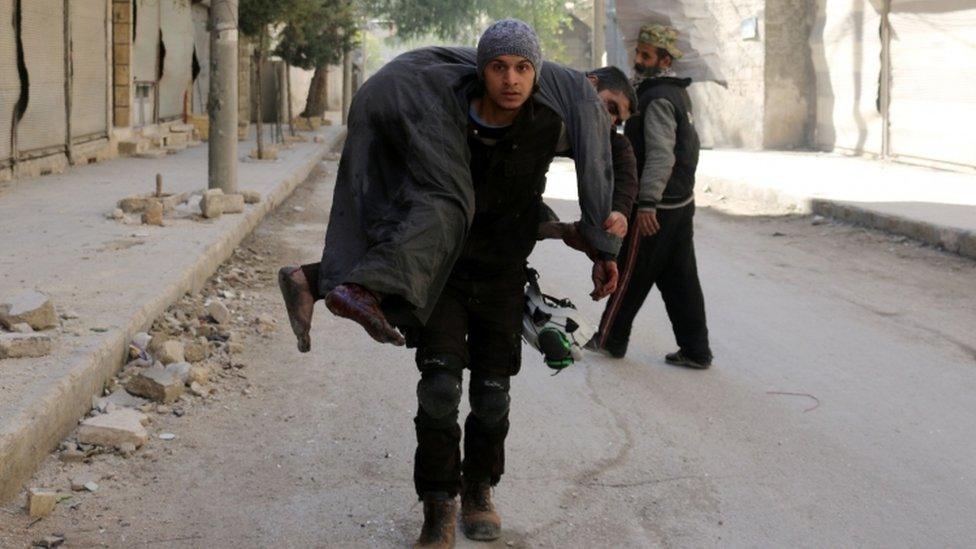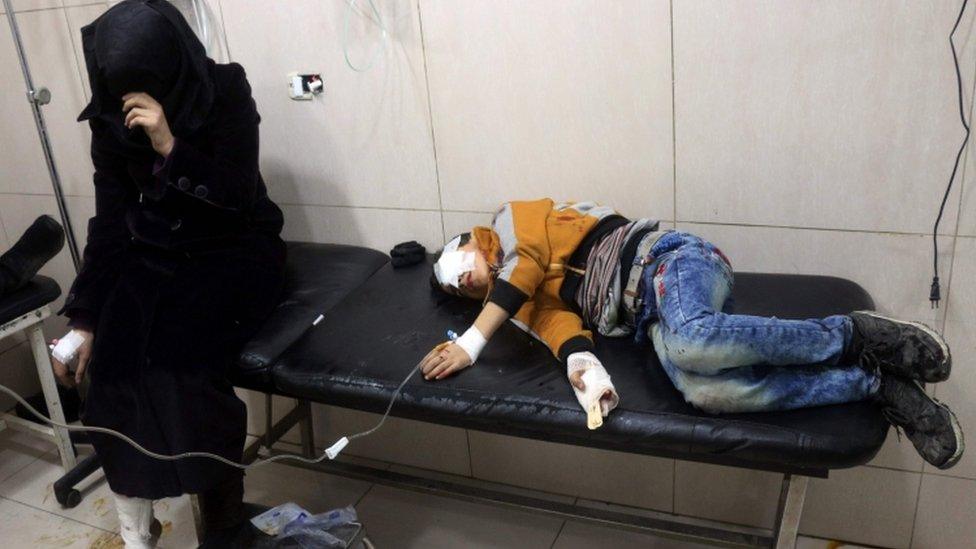Syria conflict: Aleppo hospitals 'knocked out by bombardment'
- Published
Air strikes have destroyed all hospitals in eastern Aleppo, according to observers.
Some of the heaviest bombardment so far on Aleppo has left rebel-held parts of the Syrian city virtually without medical facilities, observers say.
The World Health Organization says all makeshift hospitals there are out of service, after five days of air and artillery strikes by government forces.
Other reports suggest some that hospitals are operational but people are too frightened to use them.
A White House statement called the assault on hospitals "heinous".
The Syria Civil Defence, a volunteer group also known as the White Helmets, said that 61 civilians had been killed in Saturday's air strikes on rebel-held eastern Aleppo.
The government-led assault on the area resumed on Tuesday, after a three-week moratorium.
Medics have in the past been able to bring field hospitals back into operation after strikes, but the lack of supplies is now so severe that this is becoming harder, Reuters news agency reports.
The recent bombardment has left streets deserted, with people trying to shelter in their homes.

The assault on eastern Aleppo has been relentless this week

The SOHR says the strikes have been so massive that residents are frightened to use medical facilities.
Reuters quotes the WHO's representative in Syria, Elizabeth Hoff, as saying on Saturday that NGOs based over the border in Turkey "confirmed today that all hospitals in eastern Aleppo are out of service".
Food running out
On Friday the UN envoy for Syria's humanitarian adviser, Jan Egeland, said eastern Aleppo faced a "bleak moment" with supplies low and winter coming.
"My understanding is that virtually all warehouses are now empty and tens of thousands of families are running out of food," he told Reuters.

Civilians in eastern Aleppo have so far received basic care in makeshift hospitals
How the conflict in Aleppo has changed the fabric of the city
Also on Friday, a volunteer with the White Helmets Civil Defence force told agency AFP news agency that he had "never heard such intense artillery bombardments".
His team had been unable to respond to an emergency call because "the shells are falling on the street", he said.
Aleppo, once Syria's commercial and industrial hub, has been divided roughly in two since 2012, with the government controlling the west and rebels the east.
On 22 September, two weeks after encircling the east and reimposing a siege on its estimated 275,000 residents, the army launched an all-out assault to take full control of the city with the help of Iranian-backed militias and the Russian air force.
Basel Ibrahem's home in Aleppo was destroyed when a parachute bomb struck the area
By the end of October, the strikes had killed more than 700 civilians in the east, while rocket fire had left scores dead in the west, according to the UN.
Russia says its air force is active in other parts of Syria, but not operating over Aleppo.
A statement by White House national security adviser Susan Rice condemned what she called "heinous actions".
"The Syrian regime and its allies, Russia in particular, bear responsibility for the immediate and long-term consequences these actions have caused in Syria and beyond," she said.
UK International Development Secretary Priti Patel said the assault was part of "a systematic campaign to remove even the most basic of services left in the city" that left hundreds of thousands of people without access to healthcare.